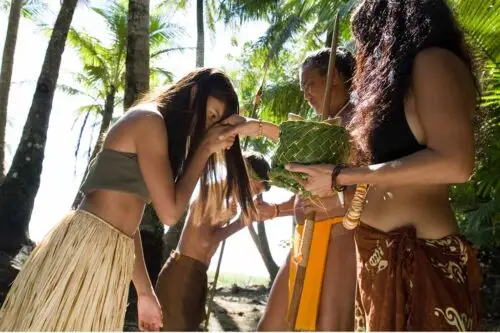Saina: Elders

Elders, parents, ancestors
Parents and other elders are important in CHamoru/Chamorro family and culture. CHamorus gain respect and status as they age. Younger relatives and friends show deference and respect to elders by sniffing or kissing the right hand or a cheek while saying ‘ñora or ‘ñot (for señora or señot) when arriving and leaving, or as part of an event. This may elicit the elder’s praise or a blessing. To not do so is considered ill-mannered, though some today are embarrassed to perform it or expect it.
The word saina, or its plural form mañaina, may refer to one’s parents, to all elders, or to CHamoru ancestors depending on the context. Mañaina value their independence and they are sources of support, guidance, protection, and wisdom for their families. Parents’ reputations hinge on raising families that abide by CHamoru morals of respect, reciprocal responsibilities, and obligations including the duty of caring for their parents.
For further reading
Craig, Ulla-Katrina. “Senior Long-term Care on Guam: Policy Options for a Transitional Society.” PhD thesis, University of Hawai’i, 1988.
Cunningham, Lawrence J. Ancient Chamorro Society. Honolulu: Bess Press, 1992.
Poehlman, Joanne. “Culture, Change and Identity Among Chamorro Women of Guam.” PhD diss., University of Minnesota, 1979.
